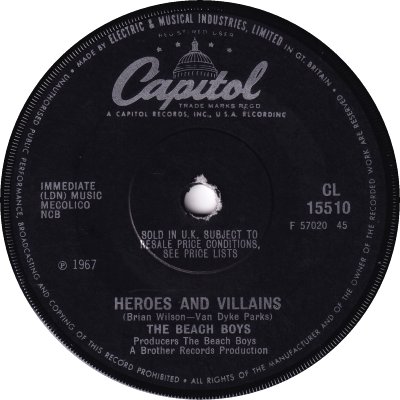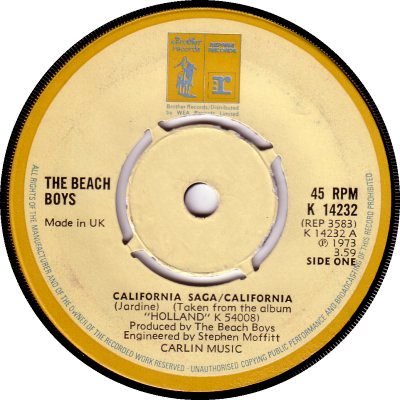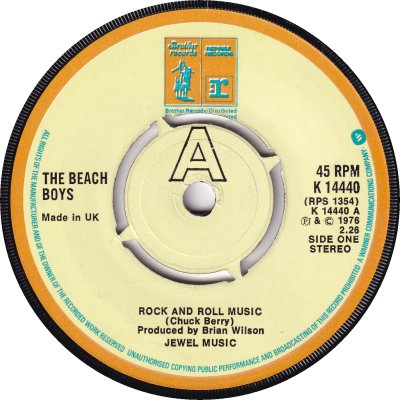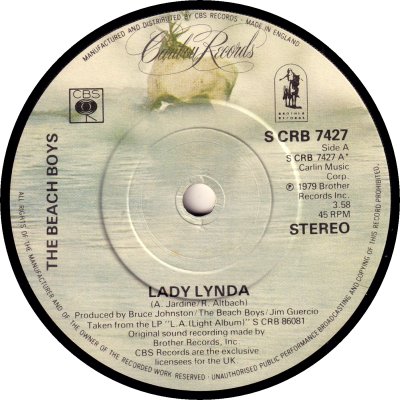



American, based in Los Angeles. Brother was basically a vehicle for records by The Beach Boys, individually and collectively. It received its first mention in 'Billboard' of the 22nd of July 1967, in an article which stated that a deal had been done for records by the band to come out on a new label, Brother. The aim was to exploit the creative and production talents of Brian Wilson and the rest of the band, and it was hoped that new artists would be signed. The contract between Capitol and the band had been adjusted to take account of the development, and the first single, 'Heroes And Villains', would be out in a few days. It appears that Capitol provided finance for the new label - 'BB' of the 4th of November 1967 observed that the company had done a similar deal with another new label.
The deal with Capitol ended acrimoniously in the spring of 1969. 'BB' of the 12th of April reported that The Beach Boys were to sever their ties with that company and were suing it for $2m over an alleged shortfall in royalties and production fees. The same article went on to say that the band had new offices in Hollywood, from which they had set up a conglomerate of new companies. As well as Brother Records there was to be a publishing firm, a travel agency and a business management firm; in addition a new studio was to be built. Nicholas Grillo and Dick Duryea were to direct the various companies. The hope was to sign new artists, whose promotion, fan clubs and so forth would be handled by American Productions, another Beach Boys subsidiary. In the event only one other band were to appear on Brother in the USA: a South African band called The Flame had an album and two singles out on the label, in 1970-71. There was however a one-off single in France in 1976, 'Tonight' b/w 'Whachersign' by Pratt & McClain (14.470) - the tracks had appeared on separate Reprise singles in the USA and don't seem to have any Beach Boys connection.
After the split with Capitol new agreements were signed. 'BB' of the 3rd of October 1970 claimed that Brother had signed a worldwide distribution deal with EMI; it added that The Beach Boys and Brother Records were being managed by Fred Vail. The issue of the 31st of October clarified the deal, saying that 'worldwide' didn't include America or Canada, where Brother was being handled by Warner Bros. The first album under the new arrangement was to be 'Sunflower'. Vail parted company with The Beach Boys and Brother early in 1971 ('BB', 30th January), and in the spring of 1972 Grillo followed him out. 'BB' of the 17th of May 1972 commented that the American Recreation Corporation was suing the band for terminating Grillo's contract as their business manager eight months early; it was also alleging misuse of funds by some members of the band. The article said that ARC was headed by Grillo and that the band was involved in the company; as an aside it said that Brother Records was part of ARC. ARC was also suing Jack Rieley, who after being appointed director of communications in the autumn of 1970 had gone on to become The Beach Boys' manager. Rieley was both good and bad for The Beach Boys. He encouraged them to adapt their style, which enabled them to regain popularity in the early / mid '70s, but recording the 'Holland' album in Amsterdam at his behest proved overly expensive ('BB', 19th of August 1972) and led to his departure.
Brother settled down and spent the remainder of the '70s releasing only new Beach Boys recordings - Capitol retained the rights to the pre-1970 material. It enjoyed a close relationship with Reprise until the final year of the decade, the logos of the two companies featuring side by side on the record labels. Then in early 1979 it moved to link up with Caribou - by that time the band was being handled by Caribou Management. It continued to serve as an outlet for Beach Boys records into the 1980s and beyond.
Brother made its debut as a label much later in Britain than it did in the States. During the Capitol period its records came out on Capitol here. 'Heroes And Villains' b/w 'You're Welcome' (CL-15510; 8/67) carried a production credit to Brother on its labels (1), but none of the following eight singles mentioned Brother. After the split with Capitol and the signing of a deal with EMI, Brother records - including a single and an album by The Flame - came out on EMI's Stateside label. All had a credit to Brother on them. When the agreement with EMI ended, Reprise took over responsibility for Brother, a logical progression as the two were linked in America. Catalogue numbers of its singles were shared with those of Reprise, and the first single under the deal, 'You Need A Mess Of Help' b/w 'Cuddle Up' (K-14173; 5/72) came out on the Reprise label with a production credit to Brother - the album from which it was taken, 'Carl & The Passions - So Tough', was also on Reprise but the labels didn't have the Brother production credit.
The Brother label as such didn't make its debut in the UK until January 1973, with the 'Holland' LP and its accompanying bonus 7" EP. The first single on Brother featured two tracks from the album, 'California Saga / California' b/w 'Sail On Sailor' (K-14232; 2/73). The logos of Brother and Reprise appeared side by side at the top of the label (2), a state of affairs that was to continue until the end of the two companies' association. The label design was to remain the same throughout, with minor differences: by the end of 1973 the credits around the circumference had been changed to include 'A Warner Communications Company' and Warner's trademark 'W', and subsequent singles had a hollow 'A' on the appropriate side (3). The final Brother / Reprise single was 'Peggy Sue' b/w 'Hey Little Tomboy' (K-14489; 10/78); 'Kona Beach' b/w 'Sweet Sunday Kinda Love' (K-14494; 12/78) featured another two tracks from the same LP, 'M.I.U. Album' and came out shortly after but it was on Reprise with no mention of Brother. After the move to Caribou in 1979, Brother was reduced to a logo on the Caribou label (4). There were no Brother / Reprise demos, demos of 'California Saga / California' having standard Reprise demo labels. Caribou / Brother demos were marked with a large hollow 'A' and the appropriate text. There were no company sleeves. Manufacture was usually by CBS, though some copies of the 'Mona' EP appear to have been pressed by Linguaphone. Distribution was initially by CBS, with WEA taking over in 1976.



Copyright 2006 Robert Lyons.

